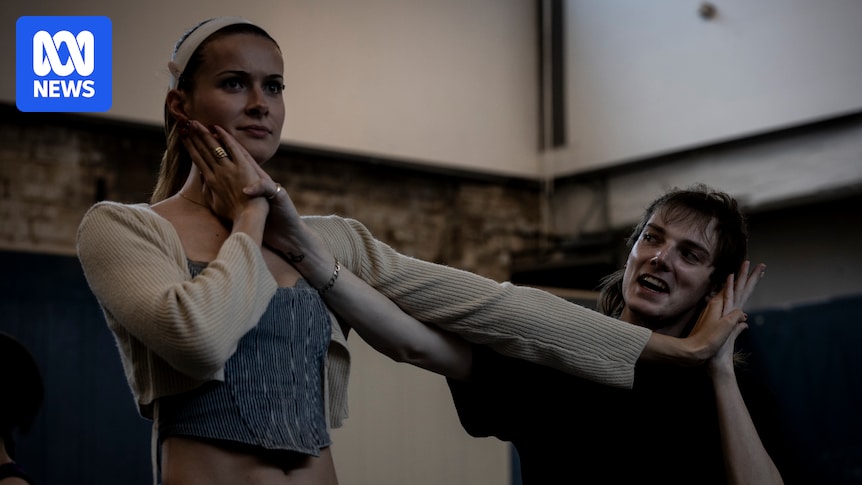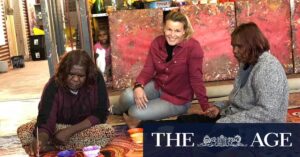
“The thought of performing on rollerskates kind of churns my stomach at the moment,” jokes actor Janet Anderson, who stars in Belvoir St Theatre’s latest production, Orlando. “But every day I’m getting a little bit better.”
In a pivotal scene in Virginia Woolf’s 1928 novel Orlando: A Biography, a Russian princess ice skates over a frozen River Thames and captures the attention of a young English nobleman named Orlando. To bring this to life on stage, director Carissa Licciardello has put her cast on rollerskates. This bold choice is part of a contemporary adaptation of Woolf’s classic, developed alongside collaborator Elsie Yager.
“At some point, one of our collaborators said, ‘is it crazy to put everyone on rollerskates?'” Licciardello recalls. “So we kind of went to them and said, ‘how do you feel about doing this?’ And all of them were like, ‘absolutely, let’s go’ and started doing lessons and prepping for it.”
A Time-Traveling, Gender-Bending Classic
Woolf’s novel tells the story of Orlando, a rich and handsome aspiring poet from the Elizabethan era who inexplicably lives for centuries and one day wakes up as a woman. The novel is widely considered a queer love letter to Woolf’s close friend and lover, Vita Sackville-West, and explores themes of gender and identity.
“We’re watching a world that is really fixed and then finds itself in revolution over and over again,” Licciardello explains. “And as time shifts and the world shifts, so does Orlando.”
While Woolf may not have had the language to describe the trans experience, the novel’s themes resonate powerfully today. “Trans experience sits at the center of the work,” Licciardello notes. “Around that is pansexuality and bisexuality.”
Authentic Casting and Representation
In Belvoir’s production, the role of Orlando is played by four different actors, each from the trans or non-binary community. “What’s exciting about the novel is I think Woolf was exploring gender fluidity in a way that maybe wouldn’t have been super apparent at the time,” Licciardello says. “[It] felt essential that we could have artists who bring lived experience and insight into what these characters are going through.”
Janet Anderson, a rising star and NIDA graduate, plays Orlando number two. “I play Orlando when she first kind of appears as a debutante and is welcomed into high society around Restoration-era England,” Anderson shares. Inspired by Tilda Swinton’s portrayal of Orlando in the 1992 film adaptation, Anderson is bringing her own interpretation to the stage. “The kind of style we’re going for is a bit larger than life,” she explains.
Trans and Queer Joy Amidst Challenges
At a time when LGBTQ+ rights face international threats, Anderson, a trans woman, finds excitement in Belvoir’s vision for Orlando. “This current climate is a tricky one, and being a trans actor in the state of things can be a little hairy,” she admits. “I’ve been lucky enough to play quite a few trans roles in my career so far, but this is the first time I’ve been able to work with an ensemble like this where we’ve really been able to kind of unpick it from all our different lived experiences.”
Anderson emphasizes the importance of showcasing trans and queer joy on stage. “This work has a real joy behind it. And I’m just excited for people to be able to have a kind of magical theatre experience while also being able to feel seen and heard,” she says.
Sticking a Finger Up at Power
“It’s this total bubble of playfulness and cheekiness and subversion of power dynamics,” Licciardello remarks. “And I think that’s a really powerful thing in a world where, you know, things are very difficult for the queer community.”
The production of Orlando at Belvoir St Theatre represents a powerful reclaiming of joy and freedom for the queer community. “It’s a really powerful thing for a group of queer people to claim joy and freedom, playfulness … kind of sticking your finger up at power,” Licciardello concludes.
As the curtain rises on this innovative adaptation, audiences are invited to experience a world where identity and expression are celebrated, and where the spirit of Virginia Woolf’s groundbreaking work continues to inspire new generations.







